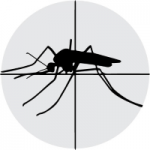Tag: Mosquito Research and Control Unit

MRCU suspends aerial spraying due to Sahara dust
The Mosquito Research and Control Unit (MRCU) advises the public that aerial spraying in response to heightened mosquitoes levels will be paused due to conditions brought on by the Sahara dust plume. This is to prevent material released by MRCU planes binding to the dust and rendering that material much less efficient in controlling biting […]

MRCU adds mosquito surveillance staff
(CNS Local Life): The Mosquito Research and Control Unit (MRCU) has added three disease protection officers (DPO) to its team, with two of the recruits hired following recent promotions within the team, and the third taking charge of the unit’s expanding services in Little Cayman.

MRCU uses mosquitoes to teach students maths
(CNS Local Life): Two Mosquito Research and Control Unit (MRCU) staff recently taught 150 Cayman Prep primary students the relationship between maths and mosquitoes as well as how to prevent the disease-causing insects from breeding. After the five-day programme held last month, junior entomologist Whitney Ebanks said she was “thrilled” to hear one of the […]

Intern learns about mozzies at MRCU
(CNS Local Life): Caymanian student Iain Robertson, who plans to pursue a career in the sciences, spent time recently as an intern at the Mosquito Research and Control Unit (MRCU). Robertson (18), a former pupil of Cayman Prep & High School, shadowed research manager Fraser Allen and laboratory technician Zoila Ebanks. He was the first […]

Concerned about pesticides sprayed in Cayman
I am concerned as to the safety of what the MRCU (Mosquito Research and Control Unit) are using when they spray to kill mosquitos and its impact on Cayman residents. I assume the liquid adulticides showing on their website are what is being sprayed from the plane. Their website shows two products: Aqua-Reslin (active ingredients permethrin 20%, piperonyl […]

Worried about spraying of insecticide
What chemicals do the Mosquito Research and Control Unit (MRCU) spray from the plane and from the fogger trucks? I see that there are protests in Miami concerning the spraying of Naled, which is said to cause birth defects of all things. It has caused me to question what we are using and what the […]

MRCU officer catches top employee award
(CNS): Leonardo Rodriguez, from the Ministry of Health and Culture, is the Cayman Islands Government Employee of the Month for May 2016. He was recognised for being most effective and responsive – traits that are critical in his position as the disease prevention officer with Mosquito Research and Control Unit (MRCU). Rodriguez manages a team of […]

Young Caymanians to work on GM mosquito release
(CNS): Oxitec, the biotechnology company producing genetically modified mosquitos, has hired four young people, including three Caymanians, to work on a pioneering project launched in Cayman earlier this month to control the insects. Cayman’s Mosquito Research and Control Unit (MRCU) has rolled out this initiative in collaboration with Oxitec, and aims to combat the dangerous Aedes aegypti […]

MRCU adds to mosquito-fighting fleet
(CNS): The Mosquito Research and Control Unit (MRCU) has recently upgraded its fleet of foggers with two new 2016 Toyota Hilux pick-up trucks, as part of their ongoing preventative measures against the threat of the Aedes aegypti mosquitoes, vector for the Zika virus.

